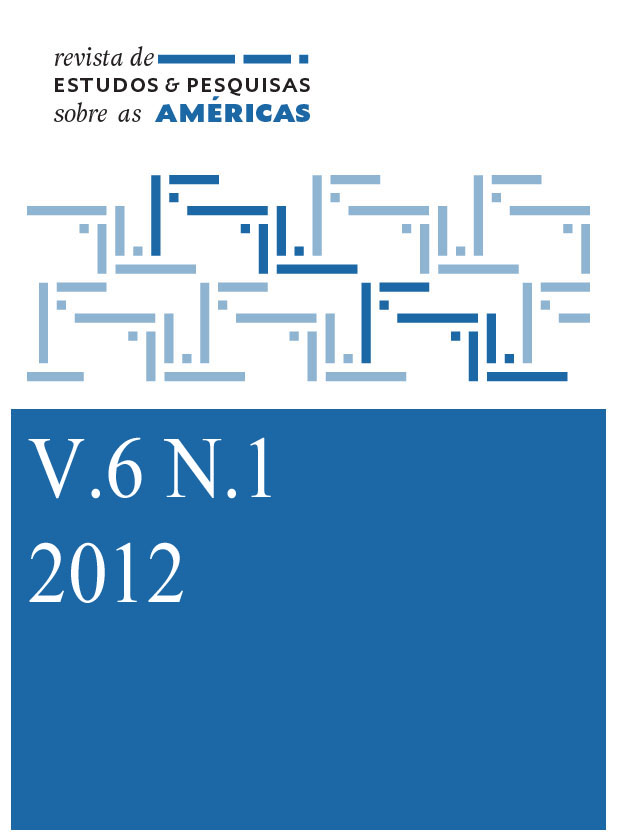Paraguaios na Espanha: remessas de divisas e demandas políticas
Keywords:
International Migration. Globalization. Remittances. ParaguayAbstract
With the process of globalization and the economic crisis faced by the Latin American countries in the last two decades of the twentieth century, intensified migration flows from countries of the region. Paraguay, as well as other Latin American countries, experienced in recent years an intense migratory flux. Unlike other times in his turbulent political history, the current wave Paraguayan migration is motivated mainly by economic reasons. In this sense, Spain has become the second destination of the Paraguayans, surpassing Brazil and Argentina, and tends to widen. This paper discusses this new wave of migration, distribution and situation there, and then analyzes the economic impact (the remittance of funds) and political (the search for representation) of Paraguayan immigrants.
Downloads
References
ARELLANO MILLÁN, M. Trabajadoras latinoamericanas en España. Migraciones Laborales y Género. Cuadernos de Relaciones Laborales. Vol. 24, no 1.
AYALA, Eligio. Migraciones. Colección Ciencias Sociales, vol 3. Editorial el Lector. Asunción, Paraguay: 1996.
CARDOZO, Arnaldo Francisco. Migrações internacionais: os blocos regionais e a mobilidade mundial de mão-de-obra. Revista Eletrônica São Paulo em Perspectiva, v. 16, no 2. p. 112-124, 2002.
COMISIÓN ECONÓMICA PARA AMÉRICA LATINA Y EL CARIBE (CEPAL). Panorama Social de América Latina 2005, Santiago de Chile, 2006.
CORSINI, Leonora. Repensando a Identidade no Contexto das Migrações. Psicologia & Sociedade; 18 (3): 23-33; set/dez. 2006.
Dirección General de Estadística, Encuestas y Censos de la Secretaría Técnica de la Presidencia de la Republica (DGEEC). Asunción, 2008.
MARTES, Ana Cristina B. e SOARES, Weber. Remessas de recursos dos imigrantes. Estudos Avançados, vol. 20, n. 57, pp. 41-54
MARTINE, George. A globalização inacabada: migrações internacionais e pobreza no século XXI. Revista Eletrônica São Paulo em Perspectiva, v. 19, no
3. p. 3-22, 2005
MELIÁ, Bartolomeu. Paraguay: identidades, sustituciones y transformaciones. Revista Diplomacia, Estrategia y Política ”“ Octubre/Diciembre 2007.
NEIRA, Fernando. Migración, remesas e indicadores económicos en la Comunidad Andina. Latinoamérica, n. 49, 2009, pp. 79-96.
OBSERVATORIO PERMANENTE DE LA INMIGRACIÓN. Anuario Estadístico de Inmigración 2007. Madrid: Secretaría de Estado de la Inmigración y Emigración, 2008.
PATARRA, Neide Lopes. Migrações internacionais de e para o Brasil contemporâneo. Revista Eletrônica São Paulo em Perspectiva, v. 19, no
3. p. 23-33, 2005.
POLÍTICA MIGRATORIA ARGENTINA E INMIGRAÇÃO PARAGUAYA ”“ Federación de Asociaciones Paraguayos Residentes en Argentina ”“ FAPRA. Buenos Aires, 2009.
PAREDES, Roberto. Por qué cayó el partido Colorado. Asunción, Paraguay: Ed: Servi Libros, 2008.
PRIMER CONGRESO DE LA MIGRACIÓN PARAGUAYA: la diáspora paraguaya. Sala de Sesiones del Congreso Nacional ”“ Asunción ”“ Paraguay. 9 de julio de 2008.
SERRANO, Pablo. Desarrollo y migración. Flujos migratorios y remesas en América Latina y el Caribe. La experiencia de la CEPAL. Revista Redes, n. 8, febrero, 2002
VALIDESAU, Tomás Palau. La política y su trasfondo. El poder real en Paraguay. Nueva Sociedad, n. 229, septiembre-octubre de 2010.
Downloads
Published
How to Cite
Issue
Section
License
The published material is the property of the Journal, and may be reproduced in whole or in part with indication of the source.
Copyright: Authors will be responsible for obtaining the copyright of the material used. Authors who publish in this journal agree to the following terms:
a)Authors retain the copyright and grant the journal the right of first publication, with the work simultaneously licensed under
the Creative Commons Attribution License which allows the sharing of work with acknowledgment of authorship and initial publication in this journal.
b) Authors are authorized to take additional contracts separately, for non-exclusive distribution of the version of the work published in this journal (eg, publish in institutional repository or as a book chapter), with acknowledgment of authorship and initial publication in this journal.
c) Authors are allowed and encouraged to publish and distribute their work online (eg in institutional repositories or on their personal page) at any point before or during the editorial process, as this can generate productive changes as well as increase the impact and the citation of the published work (See The Effect of Free Access).
















